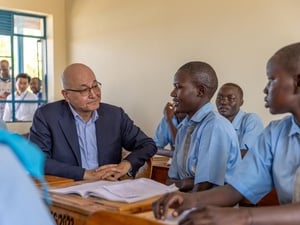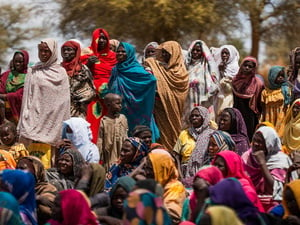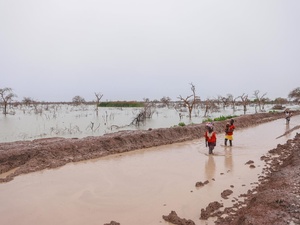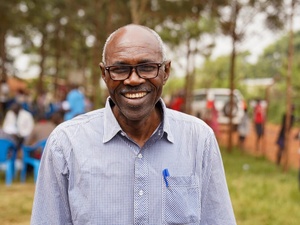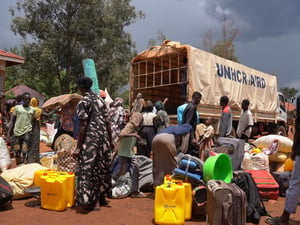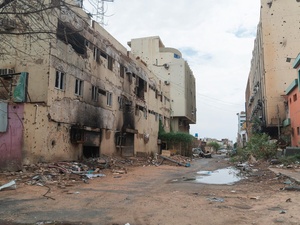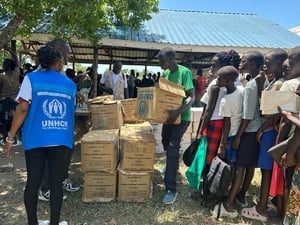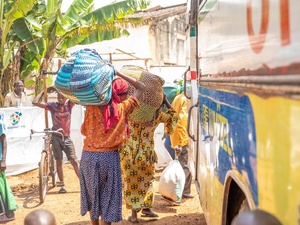Thousands flee to Uganda from South Sudan following latest violence
Thousands flee to Uganda from South Sudan following latest violence
The number of people seeking shelter and safety in Uganda from South Sudan has risen significantly in the past few days and we believe the influx will keep growing in the days ahead as tensions remain high across the border.
A total of 1,326 crossed into Uganda between Friday and Saturday, with 1,633 more arriving on Sunday. The majority are South Sudanese, but there are also believed to be some Ugandans. Prior to Friday, the average daily rate was 233. These new arrivals bring the total number to have fled to Uganda since the latest violence in South Sudan began on July 7 to 5,015. More than 90 per cent of the new arrivals were women and children under the age of 18 years.
UNHCR expects more people to flee to Uganda, especially now that the 200-kilometre Juba-Nimule road, linking the South Sudan capital to Uganda, has been cleared of checkpoints. As a result, more people are now coming by truck, and this explains the rising numbers of arrivals. Many are also bringing belongings.
Thousands of people have entered Uganda’s northern region via the border crossing points at Moyo, Kuluba, Lamwo, Yumbe and Elegu, while some are heading directly to Kiryandongo refugee settlement in the mid-west of the country. The border was previously closed on the South Sudan side, but restrictions have been eased.
The new arrivals are mostly fleeing from Eastern Equatoria state, with a smaller number arriving from Juba. They report that the security situation remains volatile and fighting could return at any time. The refugees talk of an increase in looting.
Inside Uganda, more than 6,000 South Sudanese are staying in the Pagiarinya settlement in Adjumani District, while others are waiting at collection points to be transferred to the settlement. A recent evaluation found that Pagiarinya has capacity for another 6,500 people, meaning it is likely to be full within a few days.
An inter-agency site assessment mission, including officials of the Ugandan prime minister’s office and UNHCR, are currently visiting sites to identify areas suitable for establishing new settlement areas.
People are arriving in Uganda tired and hungry. Many of them have walked for days carrying belongings. Others are suffering from malnutrition after walking without food for days. Militia activities in some areas of South Sudan have made it difficult to harvest crops in recent months.
The UN has said that at least 300 people were killed and over 10,000 fled their homes after the violence in Juba. We condemn violent attacks against humanitarian workers, which have left at least one person dead. Several countries have evacuated their nationals. UNHCR, as part of the overall humanitarian response, is undertaking assessments and providing assistance in displacement sites.
Although a fragile ceasefire has held since late Monday, the United Nations has warned of the possibility of fresh fighting in Juba. The situation is being exacerbated by the devaluation of the South Sudanese pound, leading to skyrocketing prices and making the food that is available too expensive for many. The fighting also disrupted supply routes from Uganda into South Sudan, including aid and food.
In western Ethiopia’s Gambella region, the number of new arrivals has not risen significantly since June 11, but the fresh fighting has dampened hopes of returning home soon. The Kenya-South Sudan border has also been relatively quiet. To date UNHCR has transferred 169 new arrivals from the Nadapal border to Kakuma camp.
The fresh displacement will put a further strain on UNHCR’s resources for the South Sudan operation and our ability to provide timely and life-saving assistance. Especially with access to Juba difficult. Last Friday in Nairobi, UNHCR presented a revised appeal for its South Sudanese refugees operations, seeking US$701 million. The earlier appeal for US$638 million was only 17 per cent funded.
Presenting the appeal, Ann Encontre, Regional Refugee Coordinator for the South Sudan situation, said the overall planning figure had risen from 867,239 refugees to 973,000. She warned that it could pass the 1 million mark in the coming months.
For more information on this topic, please contact:
- In Nairobi, Teresa Ongaro, [email protected], +254 735 337 608
- In Nairobi, Duke Mwancha, [email protected] +254 722 207 863
- In Kampala, Charles Yaxley, [email protected] , +256 (0) 776 720 045
- In Gambella, Sulaiman Momodou, [email protected] +251 935 978 519
- In Geneva, Leo Dobbs, [email protected] +41 79 883 6347


